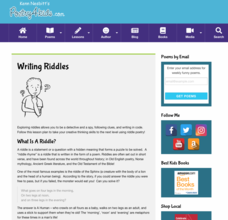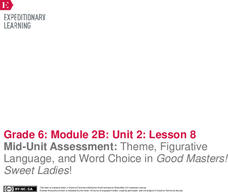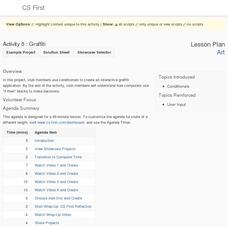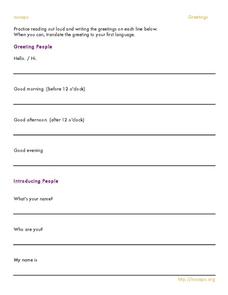Poetry4kids
Writing Riddles
What's got 60 eyes, 150 fingers, and an endless number of ideas? Your language arts class! Challenge young writers to come up with clever riddles with an online poetry lesson.
EngageNY
Mid-Unit Assessment: Theme, Figurative Language, and Word Choice in Good Masters! Sweet Ladies!
Time to show what you know. Scholars complete a mid-unit assessment to demonstrate their learning from the past lessons. Learners work independently to identify the theme and answer questions about Pask, the Runaway. They also examine...
EngageNY
Analyzing Point of View and Figurative Language: Chapter 3
Get to the point ... the point of view, that is! Pupils analyze Laurence Yep's Dragonwings for tone, figurative language, and point of view by completing graphic organizers. Scholars also read an excerpt from the novel and record the...
Google
Art: Graffiti
Your principal won't mind graffiti, as long as it's on a virtual wall. Scholars use the Scratch block-based computer language to write a program on graffiti. The program lets users place certain designs on a wall.
Mailbox Education Center
On the Hunt: Understanding Figurative Language
Young writers hunt for examples of figurative language in their reading. The hunt requires pupils to cite their sources, record a quoted example for each type of figurative language, and an explanation of what they think the examples...
K12 Reader
If
Rudyard Kipling's advice to his son in the poem "If" is a resounding message that echoes through generations. After reading the famous poem, middle schoolers work on analyzing specific lines, completing activities based on unfamiliar...
Curated OER
Practice Book O
Whether you need resources for reading comprehension, literary analysis, phonics, vocabulary, or text features, an extensive packet of worksheets is sure to fit your needs. Based on a fifth-grade curriculum but applicable to any level of...
Novelinks
Tuck Everlasting: Similes, Metaphors, and Personification in Imagery
Poetic language is abundant in Natalie Babbitt's beautiful novel, Tuck Everlasting. Learners note the examples of similes, metaphors, and personification they find as they read, and illustrate how the language creates a sensory...
American English
Welcome to the Color Vowel Chart
Focus English language learners' attention on word stress and phrase stress with a pronunciation chart that breaks the sounds into moving and non-moving vowel sounds. The chart tool uses colors and key words to indicate where to put the...
K12 Reader
What Is a Simile?
As fun as a barrel of monkeys, this figurative language activity will engage your students in learning to write similes. Asking them to first think of adjectives describing the six nouns listed on the page, this exercise has young...
Smekens Education Solutions, Inc.
Introducing the 6 Traits to Students
Put together an English language arts unit on the six traits of writing with this helpful collection of resources. From fun songs to differentiated writing exercises reinforcing each of the traits, great ideas are provided for developing...
Core Knowledge Foundation
Sixth Grade Poetry
Study some of the most prominent poets and works of poetry in history with a language arts poetry unit. From Virgil to Shakespeare to Dickinson to Angelou, the resources present biographies and examples of poetic elements to the sixth...
TV411
How Many Languages Do You Speak When You Speak English?
What do the words pizza, broccoli, and ciao have in common? Why they are all English words that originally came from Italian. Ask your middle schoolers to guess the origins of a list of words by matching the word with the language from...
Forum
A Research Toolkit of 12 Reading Strategies for the Foreign Language Classroom
Learning to read is not a simple task, but there are methods for assisting pupils as they develop literacy skills. The first four pages of this resource include information about language development and reading development, as well as...
English Enhanced Scope and Sequence
Research Project Embedded with Media Literacy
Here is a phenomenal language arts lesson on media literacy for your middle and high schoolers. In it, learners produce a research product in the form of a public service announcement (PSA). First, they view examples of these PSA's to...
Waunakee Community School District
Identifying Themes in Literature
If your language arts learners have a hard time determining the universal theme of a written work, use a straightforward worksheet to help them find it. After reviewing a list of common themes, kids note the title, character, plot, point...
Curated OER
Monster Vocabulary
Challenge language arts learners with a crossword puzzle that focuses on vocabulary words from Walter Dean Myers' Monster. After kids read the clues at the bottom of the page, they complete the puzzle with their newly defined words.
Roald Dahl
Matilda - Miss Honey and The Trunchbull
As the instructor reads aloud several quotes from five chapters of the story Matilda, class members mime their interpretation of the scenes. Then, after reading "Miss Honey" and "The Trenchbull" (chapters seven and eight), the class...
Hood River County School District
Text Structure: Features and Organization
Teach learners how to interact with both fiction and non-fiction text with a packet of activities and worksheets. After looking over text structure and the difference in text features between different types of writing, readers analyze...
Poetry4kids
How to Write an Exaggeration Poem
The best poetry writing lesson of all time is here for you! Learn all about the art of exaggeration with a lesson on exaggeration poems, which instructs students to use wild imagery to convey their message.
Nosapo
Greetings
Hi! How are you? Join the conversation with a straightforward exercise on English greetings. After translating common greetings into their first languages, class members practice greeting each other and note the appropriate responses.
E Reading Worksheets
Figurative Language Finder
To demonstrate their understanding of figurative language, middle schoolers use a guided reading worksheet to find examples of figurative language in a text, identify the technique being used, and to explain how they were able to...
K12 Reader
Using Similes
Your class will find using similes as easy as pie after completing this figurative language exercise. Provided with a list of incomplete similes, young writers must use their creativity to fill in the blanks with nouns that accurately...
Curated OER
Tears of Joy Theatre Presents Anansi the Spider
Accompany the African folktale, Anansi the Spider, with a collection of five lessons, each equipped with supplemental activities. Lessons offer multidisciplinary reinforcement in English language arts, social studies, science, and arts...
Other popular searches
- 5th Grade Language Arts
- 3rd Grade Language Arts
- 4th Grade Language Arts
- Second Grade Language Arts
- English Language Arts
- 1st Grade Language Arts
- Kindergarten Language Arts
- Language Arts Jeopardy Game
- First Grade Language Arts
- Language Arts School Projects
- Language Arts Lesson Plans
- Language Arts Games

























